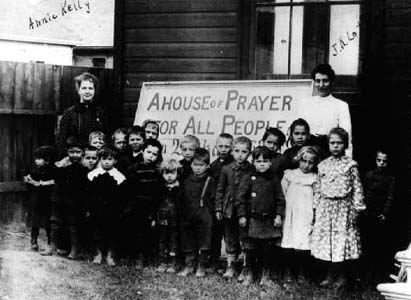Search | Image Archive | Reference | Communities | POV | Lesson Plans | Credits
 The Methodist church, compelled by the values of the Social Gospel which called for the development of healthy, sanitary, and "morally sound" human environments, was one of Canada's largest operators of missions. Among these, the All Peoples' Mission in Winnipeg stands out. It was established in 1892 in one of the city's poorest neighbourhoods. Between 1907 and 1913, the Mission was under the superintendency J. S. Woodsworth, a tireless advocate for the rights and dignity of immigrant populations.
The Methodist church, compelled by the values of the Social Gospel which called for the development of healthy, sanitary, and "morally sound" human environments, was one of Canada's largest operators of missions. Among these, the All Peoples' Mission in Winnipeg stands out. It was established in 1892 in one of the city's poorest neighbourhoods. Between 1907 and 1913, the Mission was under the superintendency J. S. Woodsworth, a tireless advocate for the rights and dignity of immigrant populations.
At the end of the nineteenth century, Winnipeg transformed from a regional centre for an agrarian community to a bustling urban metropolis. The city's population grew by half in the first decade of the twentieth century, and many of the new residents were immigrants who arrived from Central and Eastern Europe with little knowledge of Canadian language or customs. Most lived in poverty, unable to make a living wage or attain a reasonable standard of living. Many settled in Winnipeg's North End, which became home in this era to sprawling slums and tenements as housing demands far outstripped supply.
Many charitable and religious organizations commenced work in those areas where the new immigrants settled. They offered services that included direct charity work, basic English language and literacy instruction, and short courses in health and hygeine, child care, and cooking and nutrition. Some, like the Margaret Scott Nursing Mission specialized in providing public health services, while others like those run by the Salvation Army offered immediate assistance to the destitute.
Like many missions, the long term goal of the All Peoples' Mission was to reach a section of the population which was largely isolated from the denominational churches and to assimilate immigrants to British-Canadian values. One of its most successful programs was the Peoples' Forum, a series of lectures at the Grand Theatre on Main Street which were generally followed by evening performances featuring the music and dance of non-British cultural communities. In this way, the Mission promoted harmony among divese ethnic groups while providing instruction in British-Canadian cultural norms.
Some of the other innovative programs offered by the All Peoples' Mission included two free kindergartens; mothers' courses in home economics, health and hygiene; night classes in English language and "civics"; visits to immigrants homes; swimming and gymnasium facilities; a legal service; a hospital visitation program; a Sunday School; and "fresh air clubs" and summer camp programmes for children.
Programs like these were vital in that they equipped many immigrants with the necessary tools to survive in a foreign land, but were also clearly assimilationist in tone and purpose. Their goal was to ensure social harmony by helping the largely Eastern-European population conform more closely to British Canadian standards of propriety, dress and conduct.
See also:
Historic Sites of Manitoba: All People’s Mission (119 Sutherland Avenue, Winnipeg)
Page revised: 27 February 2011